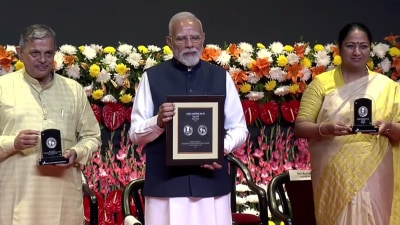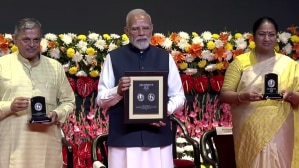Unarmed and Dangerous
2001 After the Central Vigilance Commission report on defence deals worth more than Rs 75 crore was submitted to then Defence Minister Jaswa...

 2001 After the Central Vigilance Commission report on defence deals worth more than Rs 75 crore was submitted to then Defence Minister Jaswant Singh, the Ministry wrote to then CVC N Vittal, asking him if there were any documents to prove the presence of middlemen in arms deals.
2001 After the Central Vigilance Commission report on defence deals worth more than Rs 75 crore was submitted to then Defence Minister Jaswant Singh, the Ministry wrote to then CVC N Vittal, asking him if there were any documents to prove the presence of middlemen in arms deals.
Vittal apparently replied saying that the ‘‘preponderance of probability’’ pointed to their involvement. To his report, he attached the entire transcript of ‘Operation Westend’ (the Tehelka sting operation) to prove middlemen were indeed part of hardware contracts.
Interestingly, later in the year, the then defence secretary and the then security adviser to Jaswant Singh urged the CAG and the CVC respectively to vet defence deals before they were sealed. Both reportedly agreed to do so verbally, but later wrote that they were required to examine deals only post-facto.
2005 Parliament is still demanding that the CVC report be tabled in the House.
Defence Minister Pranab Mukherjee still wants the CAG and the CVC to vet all defence deals before they are signed.
The issue of ‘‘preponderance of probability’’ of middle-men in the defence deals is still being debated and all Indian Army procurements, notwithstanding Prime Minister Manmohan Singh’s recent remarks, are virtually on hold.
POLITICISATION of arms deals has the most frustrating and terrible of impacts on the Army, the men who need the material don’t get it on time,’’ says former Army chief Ved Prakash Malik.
|
SHOT LIST
|
|
|
The weapons deals |
‘‘I’d said this even during Kargil. We are not bothered about who runs the scams, but it does have a major impact on Army morale and preparedness. I would recommend making the price negotiation committees transparent by allowing an all-party standing committee to sit in on big purchases, so there is no bickering later. In my time, that sort of bickering happened over the acquisition of T-90 tanks from Russia. Who can guarantee that post-Kargil there will be no war with Pakistan? The threat has receded only marginally.’’
However, after the UPA government’s U-turn on Kargil affidavits and the Denel anti-material rifle controversy, the Defence Ministry has developed cold feet on acquisitions. And not for the first time.
The Bofors controversy of the early 1990s effectively shelved all procurement plans; it took the Kargil war to shake up the government and launch modernisation plans. The focus on maintenance — not acquisition — is clearly borne out by defence budgets of the 1990s.
Says a former special secretary (procurement): ‘‘It was only after we saw our boys were dying in Kargil that we decided to speed up the acquisition process and show the same courage as the boys battling at Tiger Hill.’’
The Tehelka episode, though, plunged the bureaucracy back into inertia: In the 2001-02 and 2002-03 fiscals, the Defence Ministry surrendered Rs 6,000 crore and Rs 9,000 crore in capital outlay (marked for acquisitions). It wasn’t till last year that the Defence Ministry utilised the capital budget for the first time in three years.
Arms and the Men
HOWEVER, by referring to the CBI 38 defence deals — 23 related to Kargil purchases, 14 connected with the Tehelka expose and the Denel deal — the UPA government has willy-nilly ensured the Army’s modernisation plan goes haywire. With the bureaucrats who processed the under-investigation deals still serving in the Defence Ministry, a big question mark looms over future procurement.
According to the top brass, there is a strong possibility that the Army’s Rs 7,000-crore capital outlay will go at least partially unused as a large portion of this sum was to go into self-propelled guns — one of the wares of the now-controversial South African firm Denel. Catch an official touching the deal now.
‘‘Because of budget denials for the past 15 years, modernisation has already suffered considerably,’’ points out former Army chief and J&K governor K V Krishna Rao. ‘‘Gen Malik had famously said the Army would fight Pakistan with whatever it had. This was not a good reflection of how well it was equipped.’’
‘‘After Kargil, the government has concentrated on equipping the Army for mountain warfare, but I still hold that major parts of all future wars will be fought in the plains. As Army chief, I was the first to tell Indira Gandhi that we need self-propelled artillery that can move with armoured and mechanised forces in the plains, and we had considered French guns, but the deal fell through in the midst of the Bofors controversy. The need for weapons currently delayed are urgent and compelling. The government should sort out all the problems. These weapons are a necessity.’’
Endgame
IT is nobody’s case that arms deals should not be transparent or that middlemen do not exist — the Khannas, Nandas and Chaudhary brothers are thriving — but the UPA government’s methods clearly show the politicisation of arms deals and this has even got the CBI worried.
When the papers on Denel were sent to the CBI last week, the agency sent them back to the government, asking it to spell out what it wanted investigated. Even in the coffin scandal, the Army has clearly told the Defence Ministry that the then Defence Minister George Fernandes did not sign the procurement file.
Likewise, the charge that Denel was an NDA favourite is countered by the claim that the government began looking at South Africa, Israel and France because of delays in supplies and spares from Russia.
Political battles may be won and lost in Parliament every day, but wars decide the future of a country. The question now is, are we equipped for one?
‘As minister, I came across MPs lobbying for arms manufacturers’
Are brokers involved in defence purchases
Yes, middlemen are involved in the defence deals. But members of Parliament are also not aboveboard. As defence minister, I came across members lobbying for arms manufacturers. My relationship with an old colleague—a well-known public figure—was spoiled because he was lobbying for certain people. To make defence deals more transparent and reduce the alleged influence of middlemen, we began registering middlemen.
Why didn’t it work out? And what systems are therefore needed to end the influence of middlemen?
The Defence Ministry as an establishment is also involved in the process (of acquiring arms) at various levels in various capacities. I would blame the ministry as well. Middlemen can function because some people in the ministry benefit from them. So far as the second part of your question is concerned, corruption is very difficult to deal with but nonetheless attempts can and will have to be made.
Does the UPA decision to refer purchases to the CBI qualify as an attempt?
No, it does not. These steps are politically motivated and, in the end, will demoralise the men in uniform and stop honest people for doing their jobs. After the motivated sting operation by Tehelka, no purchases were made for a year. Who suffers in the end?
The CAG report has indicated several flaws in the purchases during Kargil. How do you defend yourself?
The CAG has no clue how a war is fought. His knowledge of weapons and procurement is nil but nonetheless he is the arbiter on the purchases. During a war, when in men in uniform seek certain items in their wisdom, why should they be questioned or—even more importantly—face allegations of wrongdoing and bribery? I feel it is the job of the Defence Ministry and of the entire country to provide the fighting men all the implements they want.
The CAG has a definite sinister motive, he was part of a conspiracy. This can be gauged from the fact that the particular CAG report was leaked to some Leftists instead of being sent to the President. (CAG V K) Shunglu broke every rule in the book and he will have to answer for it.
But the allegations of bribery and wrongdoing are primarily against you.
I couldn’t care less about the allegations levelled against me. I have done nothing wrong and am ready to take them on. But by trying to target me they are dragging men in uniform into a controversy that will affect the defence preparedness of India. It is very unfortunate that men who fight for their country are being dragged into a witchhunt, the sole motive of which is to get George Fernandes. If men in uniform are involved in wrongdoing, there are ways and means of taking action, parading your forces in public is not in the best interest of the country. I would like advise Pranab Mukherjee not to touch any file because, when this government goes, he will also be hounded for cheap political gains.
But Mukherjee seems to be at the forefront of the ‘witchhunt’?
No, I am reliably informed that he is just a victim.
It is alleged that you benefited from the Denel deal.
The purchase made from South Africa has a larger geopolitical angle. We did not want Pakistan to have access to the weapons system. The then government felt that they should intervene directly and that is what we did. It is easy to do a post-mortem and attribute motives.
As regards the setting up of an ordnance factory in Nalanda, my previous constituency, the decision was taken by a committee, not by me. The proposal to set up the factory was already there when I took office. Moreover, the factory is being set up by the government, not the South African company, so where is the question of my getting any benefits?
‘There is no question of political victimisation’
George Fernandes had admitted the Tehelka enquiries considerably slowed down the arms acquisition process and made MoD officials hesitate signing purchase files. Now that you have ordered the Denel enquiry along with 37 enquiries into Kargil purchases, do you have similar reservations?
An enquiry might have slowed down the acquisition process as officials may hesitate in signing the purchase files. In a system with accountability to people we shall have to face this problem. However, adherence to procedures strictly need not necessarily slow down the process.
Are you in touch with the top Army brass about the anticipated problem of slow-down in acquisitions? Are you concerned about an impact on the forces’ morale?
We are constantly in touch with the Services with regard to procurement as they are the users. I do not think any enquiry would necessarily affect the morale of the persons (defence personnel).
The CBI does not have a very good track-record on Defence enquiries—the Bofors investigation, for instance, is still on after 17 years. Are you confident of the CBI handling so many enquiries in one go?
The CBI is a premier investigating agency of the government. They are entrusted with the job on matters of investigation, therefore we are to depend on them. As an investigating agency, the credibility of the CBI is very high. So I do not agree with your views.
The CBI now wants ‘‘self-contained’’ allegations for the enquires you have routed to them.
It is the normal practice to prepare self-contained briefs by the Ministry/ Department concerned whenever a case is referred for investigation to the CBI. So there is nothing new in it.
Are you concerned about the fact that, along with politicians, senior army officials may also be booked for signing Kargil purchase files?
I cannot comment on who are likely to be implicated in the investigation. For that we will have to wait till the investigation is over.
In the Denel case, is the MoD aware of the possible agents who have been fronting for the company?
I have ordered an enquiry to ascertain the veracity of the fact as stated in media reports in South Africa. Conclusions will be known only after the investigation. Only that will show whether there is substance (in the allegations) or there is no substance. I did not want to take a risk and wanted all facts to be ascertained. My enquiry is limited in finding out if any agents have been deployed and, if so, if any money has been paid to them. If PNC papers have leaked out, they (the CBI) will have to find out.
In view of the latest round of allegations, is the MoD proposing to remodel its scheme of registering arms agents? Why hasn’t a single agent registered so far?
How can I comment on why the arms agents are not registering themselves? We have announced this scheme and it is for them to respond.
When you came in, you said all defence purchase files will be routed to the CVC and CAG. Is that being done?
There are legal complications for CAG and CVC to give their comments on purchase proposals. They scrutinise the purchases as and when there is prima facie evidence of violation of rules and procedures in the purchase. However, while preparing the procedures we seek the advice and guidance from the CAG and CVC.
You see, the CAG has said there is a role for them only after things happen. Before an irregularity is committed how does he come in? The CVC’s viewpoint is also similar. Here too, there can be a role for the CVC once some irregularities are pointed out.
You are now facing the charge that the enquires you have initiated are politically motivated and that you are victimising your predecessor.
There is no question of any political victimisation. The government is (required) to respond whenever there are allegations of irregularities or deficiencies. This is the primary responsibility of the government of the day.



- 01
- 02
- 03
- 04
- 05




























